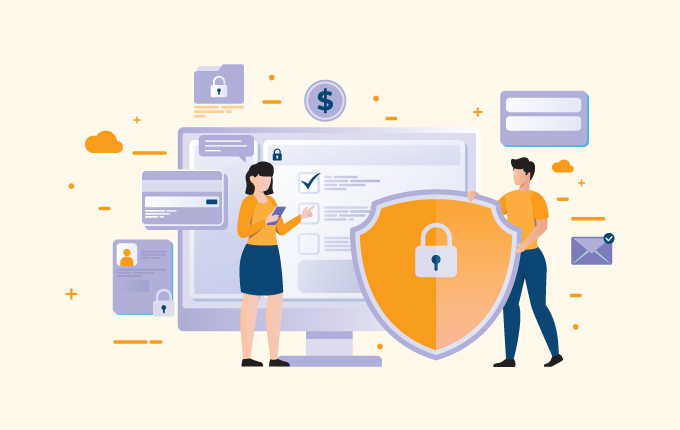Business IntelligenceCloud ServicesIT Consulting & StrategySecuritySoftware DevelopmentTech Support & Managed IT ServicesTelecommunicationsConstructionEducationFinanceHealthcareLegalNon-ProfitsReal EstateStartups
As we move towards having a healthier work-life balance as a society, we’re increasingly aware of the problems that came from the always-on, always-working approach that we’d been using up until now. Burnout is a state of mental fatigue and frustration that comes from spending too much time in stressful situations, like being at work.
According to Deloitte, 77% of employees have experienced some form of burnout in their jobs. It’s caused by a mixture of working too much, unreasonable amounts of pressure and stress (deadlines that are too close together or too tight, for example), and a lack of support from management.
The problem with burnout is that it doesn’t just affect your mood. The negative impacts are far-reaching, from your job performance to your family, life, and even your health. Unmanaged, it can lead to huge, expensive errors that affect your business. It can cause high employee turnover, and it can drive healthcare expenses up as well.
Avoiding burnout can be a challenging endeavor, but with the right technology and support from the top, you can reduce it and help your employees find a better balance.

How to prevent burnout
The first thing you need to do to prevent burnout is to know the signs. People suffering from burnout make more mistakes than usual, they’re easily frustrated, they miss more work, and the quality of the work they’re doing tends to drop.
Burnout isn’t usually caused by any one thing. The occasional long week isn’t going to push someone over the edge. It’s the result of months and months of long weeks and stress without a meaningful break.
Here are some ways you can empower your employees to create a better balance in their lives and avoid burnout.
Check-in with employees
Most people won’t reach out and tell you that they’re experiencing burnout. That’s why you need to take a proactive approach. Don’t force conversations with employees, but by checking in and asking something as simple as “How are you? Is there anything I can do to help right now?” you open the door for a dialogue between employees who aren’t doing great and management.
Promote self-care
This can be one of the best things you do for your team. By encouraging employees to set aside time for themselves, seek help when they need it, and by making room for mental health wellness that allows them to get the care they need, you are taking huge steps to prevent burnout.
This means not giving your employees a hard time if they need to take a personal or sick day. If you can, make it so benefits cover therapy or counseling, massages, yoga, or other self-care options. You’ll want to try and keep this as open as possible so that you’re not trying to push people to forms of self-care that don’t work for them. Everyone will have specific needs when it comes to avoiding burnout, so the more open you’re able to be, the better. As an example, you promote self-care by offering gym or fitness center memberships to staff.
Automate repetitive tasks
When you remove low-level tasks from people’s workload, you reduce the aspects of their jobs that they have to worry about. If you have an employee who’s spending 40 minutes each day cutting and pasting numbers, moving them from one place to another, you have someone who isn’t making the most of their time. These tasks add to the mental burden of their jobs. When you remove these tasks from their daily lives, you free them up to focus on the tasks that fall within their zone of genius.
By taking a careful look around your company, odds are there are a significant number of tasks that can be automated. Not only does this free up employees and prevent them from getting bogged down, but you’re also eliminating the risk of human error, which rises as employees get closer to burning out.
Use the correct tools
If you’re working with systems that kind of do what you want them to, but it’s cobbled together using a handful of different tools that don’t speak to each other, you’re adding in frustrating points that can push employees closer to burnout.
This kind of setup isn’t unusual when you’re using commercially available tools that lack the ability to integrate with other tools. That’s where having software that has been specifically designed for your company comes in. If you’re working with a system that was designed exactly for your company and contains all the necessary integrations (or, even better, contains everything in one place), you have a system that makes it easy for your employees to do their job. Similar to repetitive tasks that you can automate, a smooth workflow through software makes a huge difference in how frustrating a task can be, which reduces the likelihood of burnout.
Form strategic partnerships
Another way to help prevent employee burnout is to form strategic partnerships that remove some of the tasks from their to-do lists. A lot of times, burnout happens because there is too much work to be done and not enough people to do it. Hiring more employees isn’t usually an option, but you can outsource tasks to help them focus on the more important projects that drive business and serve your customers.
The kinds of partnerships that you form will depend on the kind of business that you run, but the following are solid examples that will help your team:
Managed Security Services Providers (MSSPs)
Making sure that your business is safe and secure from hackers is a full-time job. You have to carefully monitor your networks, educate staff, and stay vigilant. Often, businesses just don’t have the resources they truly need to protect themselves, which is why so many businesses fall victim to cybercrimes.
MSSPs are cybersecurity experts who specialize in helping other businesses stay safe. They work closely with their clients to ensure that everything is being watched, staff have the training and education they need to spot hacking or phishing attempts, and they know what threats hackers are currently using. MSSPs provide the 24/7 monitoring and protection your business needs, without putting undue stress on your tech teams.
Co-managed solutions
Co-managed solutions are offered through manage service providers (MSPs) as a way of helping you reduce the burden on your internal technology teams, without letting the work you need to be done pile up.
Co-managed solutions can take on a number of different forms, depending on the needs of your business. For example, if you need helpdesk solutions, a co-managed arrangement with an MSP can provide helpdesk levels 1, 2, and 3 services for your business, 24/7. Your digital transformation efforts can be handled. Similarly, if you need custom software for your business, an MSP can help you with that, as well.
This arrangement can be taken even further to include getting help with initiatives like moving to a new office, equipment procurement, installation, and troubleshooting. In essence, if you need help with it on a technical level, but your in-house team is too busy, a co-managed solution can help.

Looking for a strategic partner to help battle burnout?
If you’re looking for a way to help your technical staff from burning out, look no further. The experts at Manhattan Tech Support can take care of everything you need help with, so you can take care of your employees.
Through our Kaytuso, our MSSP division, we can keep your business safe from attacks 24 hours a day, seven days a week. Our digital transformation division, Exceed Digital, can help you get automation in place to remove tedious manual tasks from your workflow, and we can help you create custom software that helps you do business in the exact way that makes the most sense.
If you’d like to learn more about how we can help. Contact us today. We’ll work together to keep your technical teams happy.
[sales-phone] | [email-address]



 May 10, 2021
May 10, 2021 Homefield IT
Homefield IT

